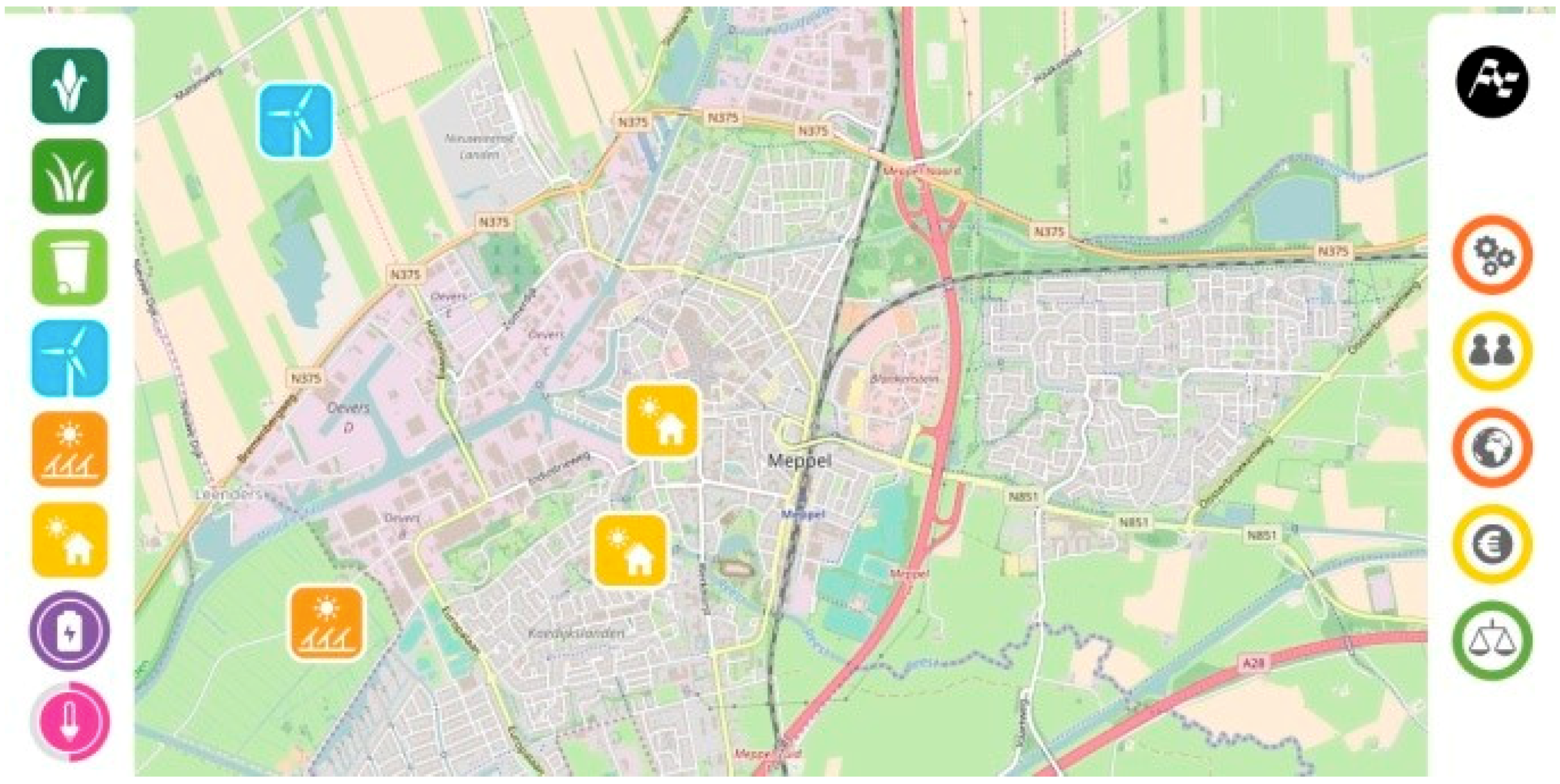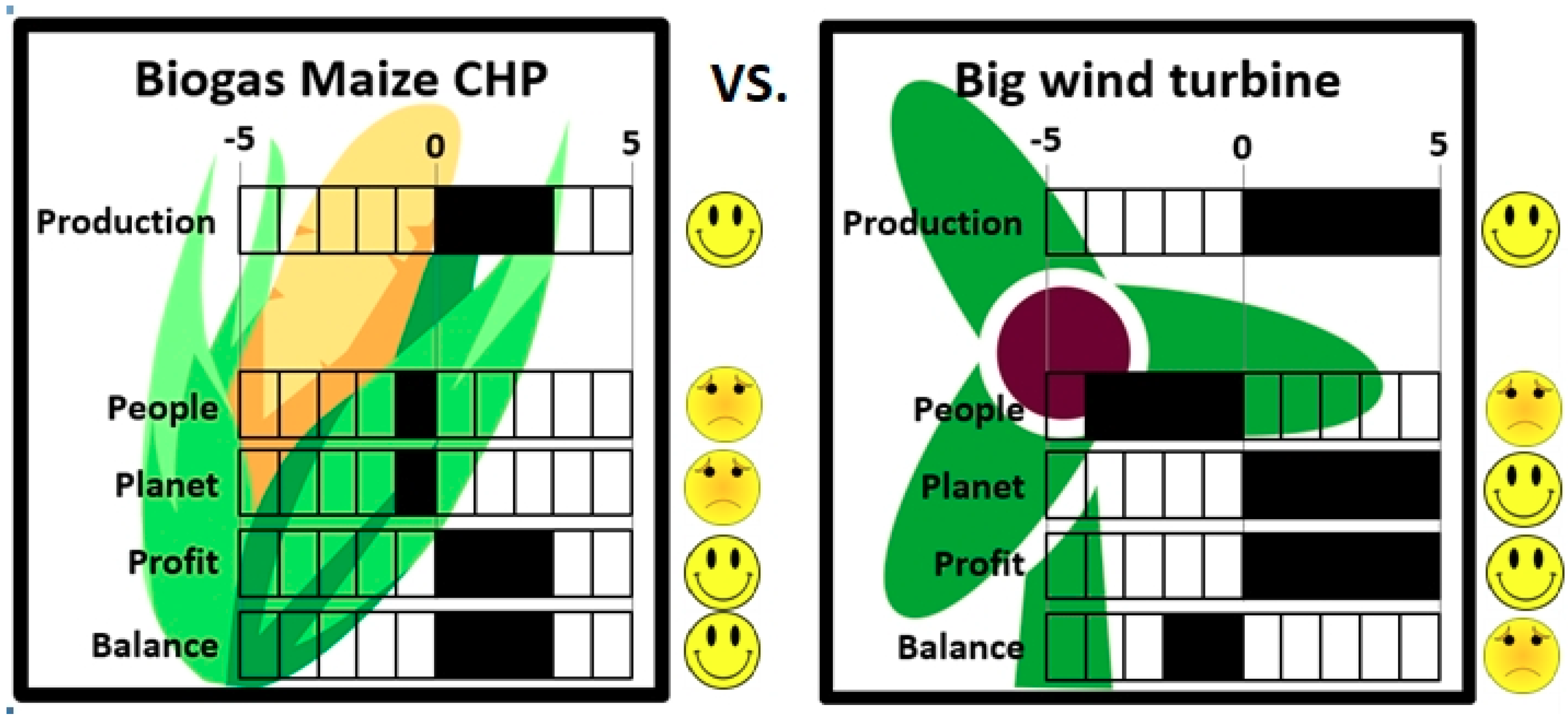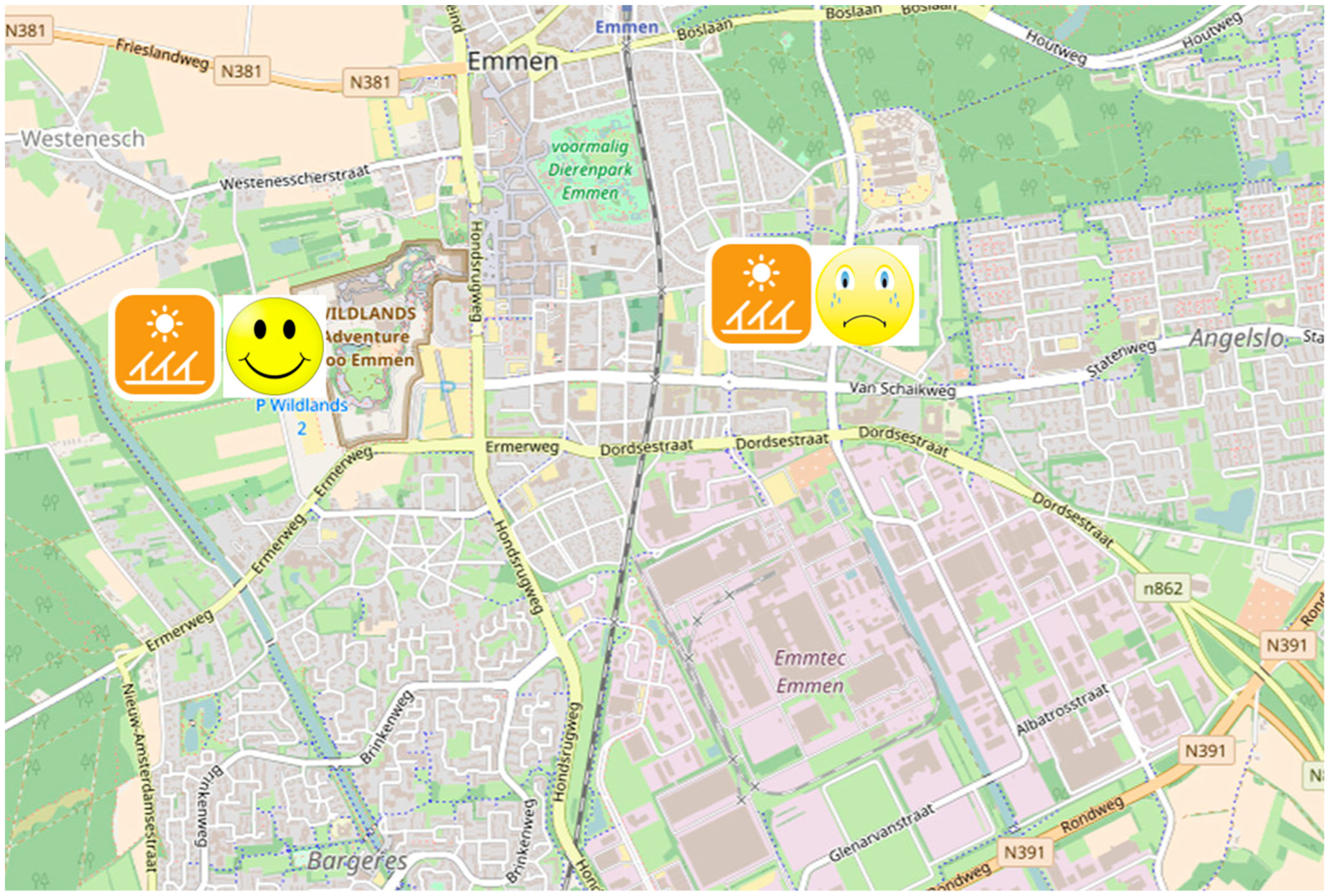Playing for a Sustainable Future: The Case of We Energy Game as an Educational Practice
Abstract
:1. Introduction
2. Energy Transition in The Netherlands: An Urgent Matter on the Agenda
3. Energy-Related Gaming Strategies
4. Methodology
5. Results
5.1. Game Analysis
5.2. The Opinion from Players
“There seems to be a general dislike towards wind turbines among the Dutch population”
“Solar panels can’t provide enough sun for everyone”
“The difficulty of satisfying people while staying green and having a good profit”
“All players/roles need to be taken into consideration for a sustainable energy transition, and that it is a lot harder than it seems to keep every party happy”
6. Discussion and Conclusions
Author Contributions
Funding
Acknowledgments
Conflicts of Interest
References
- European Union Commission. 2050 Energy Roadmap. Available online: https://ec.europa.eu/energy/en/topics/energy-strategy-and-energy-union/2050-energy-strategy (accessed on 2 May 2018).
- Moser, S. Communicating Climate Change: History, Challenges, Process and Future Directions. WIREs Clim. Chang. 2010, 1, 31–53. [Google Scholar] [CrossRef]
- Reckien, D.; Eisenack, K. Climate Change Gaming on Board and Screen: A review. Simul. Gaming 2013, 44, 253–271. [Google Scholar] [CrossRef]
- Garrido-Miranda, J.M. Videojuegos de estrategia: Algunos principios para la enseñanza. Rev. Electrón. Investig. Educ. 2013, 15, 1–12. [Google Scholar]
- Gee, J.P. Lo Que nos Enseñan los Videojuegos Sobre el Aprendizaje y el Alfabetismo; Aljibe: Archidona, Spain, 2004; ISBN 84-9700-168-0. [Google Scholar]
- Prensky, M. Digital natives, digital immigrants. Horizon 2001, 9, 1–6. [Google Scholar] [CrossRef]
- Wu, J.; Lee, J. Climate change games as tools for educational and engagement. Nat. Clim. Chang. 2015, 5, 413–418. [Google Scholar] [CrossRef]
- Flora, J.A.; Saphir, M.; Lappé, M.; Roser-Renouf, C.; Maibach, E.W.; Leiserowitz, A.A. Evaluation of a national high school entertainment education program: The Alliance for Climate Education. Clim. Chang. 2004, 127, 419–434. [Google Scholar] [CrossRef]
- Knock, E.; De Vries, P.W. EnerCities, a Serious Game to Stimulate Sustainability and Energy Conservation: Preliminary Results; eLearning Papers; Elsevier: Amsterdam, The Netherlands, 2011. [Google Scholar]
- Ouariachi, T.; Gutiérrez-Pérez, J.; Olvera-Lobo, M.D. Criterios de evaluación de juegos online sobre cambio climático: Aplicación del método Delphi para su identificación. Rev. Mex. Investig. Educ. 2017, 22, 445–474. [Google Scholar]
- Ministry of Economic Affairs. Energy Report Transition to Sustainable Energy; Ministry of Economic Affairs: The Hague, The Netherlands, 2016.
- Government of The Netherlands. Government to Invest €300 million in Climate Measures. Available online: https://www.government.nl/latest/news/2018/03/09/government-to-invest-%E2%82%AC300-million-in-climate-measures (accessed on 2 May 2018).
- Pew Research Center. Global Attitude Survey 2017. Available online: http://www.pewglobal.org/ (accessed on 2 June 2018).
- Hagen, B.; Middel, A.; Pijawka, D. European Climate Change Perceptions: Public support for mitigation and adaptation policies. Environ. Policy Gov. 2016, 26, 170–183. [Google Scholar] [CrossRef]
- Frasca, G. Play the Message: Play, Game and Video Game Rhetoric. Ph.D. Thesis, IT University of Copenhagen, Copenhagen, Denmark, 2007. [Google Scholar]
- Statista. Game-Based Learning Market Revenue Worldwide in 2017 and 2022 (in Billion U.S. Dollars). Available online: https://www.statista.com/statistics/733616/game-based-learning-industry-revenue-world/ (accessed on 2 June 2018).
- Marczewski, A. Gamification: A Simple Introduction; Amazon.com: Seattle, WA, USA, 2012. [Google Scholar]
- Makower, J. State of Green Business. Green Biz Report. Available online: https://www.greenbiz.com/article/state-green-business-2017 (accessed on 2 July 2018).
- Baldwin, A. Could Gamification Hold the Key to Driving Demand Response? Edie.net. Available online: https://www.edie.net/news/8/Could-gamification-hold-the-key-to-driving-demand-response-/ (accessed on 2 July 2018).
- Coyne, B. Northern Powergrid Applies Gamification to Engage Domestic DSR, EVs Next. Available online: https://theenergyst.com/gengame-time-northern-powergrid-applies-gamification-domestic-dsr-evs-next/ (accessed on 2 May 2018).
- Brewer, R. Fostering Sustained Energy Behavior Change and Increasing Energy Literacy in a Student Housing Energy Challenge. Ph.D. Thesis, University of Hawaii, Honolulu, HI, USA, 2013. [Google Scholar]
- Neuendorf, K. The Content Analysis Guidebook; Sage Publ.: London, UK, 2002. [Google Scholar]
- Pierie, F. How to Measure and Optimize the Sustainability of Complex (Renewable) Energy Production Pathways: Applied to Farm Scale Biogas Production Pathways. Ph.D. Thesis, University of Groningen, Groningen, The Netherlands, 2018. [Google Scholar]
- Katsaliaki, K.; Mustafee, N. Edutainment for Sustainable Development: A survey of Games in the Field. Simul. Gaming 2014, 46, 647–672. [Google Scholar] [CrossRef]
- Ouariachi, T.; Olvera-Lobo, M.D.; Gutiérrez-Pérez, J. Analyzing climate change communication through online games: Development and application of validated criteria. Sci. Commun. 2017, 38, 10–44. [Google Scholar] [CrossRef]
- Van Pelt, S.C. Communicating climate (change) uncertainties: Simulation games as boundary objects. Environ. Sci. Policy 2015, 45, 41–52. [Google Scholar] [CrossRef]
- Soekarjo, M.; van Oostendorp, H. Measuring Effectiveness of Persuasive Games Using an Informative Control Condition. Int. J. Serious Games 2015, 2, 37–56. [Google Scholar] [CrossRef]



| Game | Producer | Description |
|---|---|---|
| WindMill Game | Persuasive Games | Strategy game about building wind farms to create clean energy profitably. Players fulfill a specified energy offset goal as quickly as possible by building turbines smartly, and research locations carefully for the best wind conditions, avoiding upsetting the local citizens by building turbines in undesirable places. |
| Energy City | JASON Digital Lab | In Energy City, players will work through a selection of 6 cities, each has its own energy detail variations and challenges, as they play a 10-year normal play, or a 20-year expert play. Players must watch out for, and observe, the important 3 meters displayed on the top of their screen, providing details about the city’s local air quality, environmental impact, and budget. |
| Enercities | Paladin Studios | In this game, the player is faced with the challenge of developing an eco-friendly city dealing with issues such as pollution, energy shortages, and renewable energy. Players place buildings on a grid to grow their city. They need to balance energy sources, cash flow, and the city’s economy, wellbeing, and environment. |
| Electrocity | Genesis Energy | Genesis has a goal of increasing public awareness by sparking interest and laying the foundation for future learning about key dilemmas related to energy generation, cost of production, and environmental impacts. The player becomes the mayor of a town, starting by naming the town and giving population of 10,000 and a budget of $1000. From there, players have 150 turns of the game to make their town sustainable. |
| Name of the Game | URL | Creator | Communicative Purpose | Brief Description |
|---|---|---|---|---|
| We Energy Game | we-energy.eu | Hanze University of Applied Sciences/Center of Expertise Energy | Develop familiarity with the topic | The game play involves collaboratively creating a blueprint of a town with a sustainable energy balance, ensuring sufficient production, the satisfaction of people, the planet, financial viability, and a balance in energy supply. |
| We Energy Game | |
|---|---|
| Relevance of narrative | Low |
| Global storyline | Challenges faced during the transition towards a sustainable community from the perspective of different roles to create more collaboration and discussion on the topic |
| Character depiction and role |
|
| Representation of the environment | Maps of municipalities in The Netherlands with icons representing energy sources, houses, roads, green areas etc. The cities represented are Diever, Meppel, Assen, and Emmen. |
| Dimension/space/scale | Real/local |
| Dimension/time | Present/future |
| We Energy Game | |
|---|---|
| Explicit use of scientific concepts | Energy efficiency, energy storage, solar parks, solar panels on roofs, wind turbines, biogas |
| Explicit use of information sources | No |
| Convergence with social networks | No |
| Message framework | Climate change mitigation Topics: energy, consumption, citizen participation, urban planning Causes: high greenhouse gases emissions Message tone: informative, pro-action |
| We Energy Game | |
|---|---|
| No. players/use | 1–5 players/collective use |
| Length of play | Less than 30 min |
| Mission | To make a town or city energy neutral: players negotiate from their respective roles which energy source they want to employ and on which location. Once agreement is reached, they place the icon that represents that energy source on the map and they check the consequences for each of the roles (production, people, planet, profit, and balance) |
| Degree of interactivity | Medium |
| Dynamics and mechanics | Dynamics: challenge, collaboration, altruism Mechanics: decision-making, time pressure, cooperation |
| Player type | Collaborator |
| Feedback system | Positive (when icons turn green) and negative (when icons turn red) |
| Reward system | No |
| We Energy Game | |
|---|---|
| Competences | Social and citizen competence, knowledge and interaction with the physical world, autonomy and personal initiative |
| Abilities | Remember, understand, apply, analyze |
| Problem resolution conditions | Reproductive reasoning and productive reasoning |
| Need for previous knowledge | Limited |
| Level of difficulty | Low |
| Possibility of group work | Yes |
| Interdisciplinary | Yes (social studies, science, mathematics) |
| Existence of didactic guidelines | No |
© 2018 by the authors. Licensee MDPI, Basel, Switzerland. This article is an open access article distributed under the terms and conditions of the Creative Commons Attribution (CC BY) license (http://creativecommons.org/licenses/by/4.0/).
Share and Cite
Ouariachi, T.; Elving, W.J.L.; Pierie, F. Playing for a Sustainable Future: The Case of We Energy Game as an Educational Practice. Sustainability 2018, 10, 3639. https://doi.org/10.3390/su10103639
Ouariachi T, Elving WJL, Pierie F. Playing for a Sustainable Future: The Case of We Energy Game as an Educational Practice. Sustainability. 2018; 10(10):3639. https://doi.org/10.3390/su10103639
Chicago/Turabian StyleOuariachi, Tania, Wim J. L. Elving, and Frank Pierie. 2018. "Playing for a Sustainable Future: The Case of We Energy Game as an Educational Practice" Sustainability 10, no. 10: 3639. https://doi.org/10.3390/su10103639
APA StyleOuariachi, T., Elving, W. J. L., & Pierie, F. (2018). Playing for a Sustainable Future: The Case of We Energy Game as an Educational Practice. Sustainability, 10(10), 3639. https://doi.org/10.3390/su10103639






